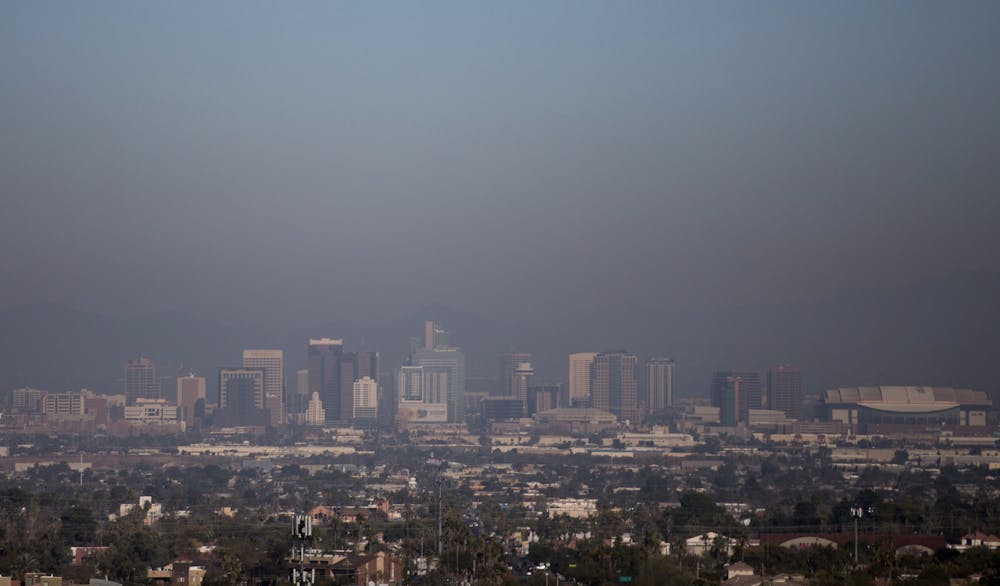Particle pollution is set to rise in Phoenix following a summer in which the city produced some of the country's worst ozone pollution levels.
The American Lung Association published its annual “State of the Air” report in April earlier this year, ranking Phoenix as one of the most heavily polluted cities in the United States. In its report, Phoenix ranked as the fifth-worst city for ozone pollution and ninth-worst for particle pollution.
Dr. Denis Cortese, CEO of the Mayo Clinic and leading pulmonologist, warned Phoenix residents of the dangers of air pollution and says the ranking Phoenix received is “very serious.”
Cortese said the ozone created in Phoenix is predominantly tropospheric ozone, a pollutant from industrial processes that, when inhaled, can trigger “programmed cell death.” Although it’s a usual occurrence in our bodies, programmed cell death can lead to larger health concerns such as cancer and Alzheimer’s disease when it occurs too frequently.
The American Lung Association reported an average of 47.7 “high ozone days” in Phoenix, or days when weather conditions and pollution combine to produce high levels of ozone that can lead to health concerns. This indicates that there is prolonged exposure to ozone in Phoenix and thus an increased risk of respiratory illness.
Ozone is not the only factor, as particle pollution also negatively impacts the health of residents in Phoenix.
Cortese said that the Air Quality Index reports on two levels of particulate matter, PM 10 and PM 2.5, with the numbers referring to the occurrences of harmful pollutants in air concentrations measured in parts per billion.
But what Cortese is concerned with is the third level, PM 1, which he says is not tracked by AQI and can be as harmful as the other two levels, if not more.
PM 1 particles are the smallest and therefore have an easier way to get into a person’s lungs and internal organs to inflict damage. Cortese said a lack of detection for these particles by organizations like the Environmental Protection Agency is concerning.
“It’s unfortunate,” Cortese said. “The people who don’t really take action for it are not necessarily the ones that are going to suffer from their inaction.”
In a random survey of students who attend Arizona State University, 92.6% said Phoenix’s air quality was "neutral" or “poor,” an indication that the pollution issue is no secret.
When asked if they experienced respiratory health issues while living in Phoenix, however, nearly 75% said no. Of the 25% who responded yes, the two main issues were allergies and asthma, issues that are created or made worse by poor air pollution.
Sammy Travis, one of the students included in the survey, said he found out about his asthma a few years ago. One of Travis’ hobbies is running, an activity he says has been hard to do with the air quality in downtown Phoenix.
“The constant smoke and smog makes it a lot worse,” Travis said. “I feel the need to wear a mask outside often.”
There were mixed reactions in the survey when it was discovered Phoenix was ranked one of the worst polluted cities in America, with some students seemingly shocked by the information while others were not surprised at all.
“This state is slowly turning into the stepchild of California,” said Ethan Troll, a student at the Cronkite school.
Casey McNulty, another Cronkite student, said, “I’ve lived in the Midwest all my life and I actually think the air is better quality here in Phoenix.”
With a lack of the true magnitude of the situation and the mixed responses from Phoenix residents, people are finding it hard to tackle the air quality issue as a whole.
Instead, the solution lies in personal health and hygiene, a concept all too familiar for the university.
ASU Health Services and Counseling, the primary care outlet for on-campus students, offers their patients treatment and advice for maintaining one's health, especially when it comes to respiratory issues.
Dr. Maria Hoertz, a medical director for ASU Health Services, said she hopes students know they have access to quality medical screenings and virtual check-ups whenever they need treatment for things such as colds, allergies or in some cases serious medical issues.
“First of all, we want to address your symptoms to make sure that you’re comfortable and you’re safe and medically cared for,” Hoertz said. “Then, we start delineating all the different things it could pose.”
Hoertz said around the time of final exams, ASU Health Services receives more visits from sick students than usual, indicating a relationship between mental stress and physical well-being. When that pairs with the poor air quality, students can feel symptoms of colds and infections for months on end, battles that students have no time to fight.
Despite the side effects of Phoenix’s polluted air, Hoertz offered a simple, yet effective solution for students who suffer from respiratory illness: engage in proper hygiene.
Washing your hair before bed can reduce the dust accumulation from a day’s worth of work, and routine washes of bedding can make a difference in a person’s life.
Then, after cleansing the body, a person can cleanse their mind with ASU’s Behavioral Health Department, a service Hoertz is glad students have access to.
“It's just the most wonderful thing to be able to have that ability and have that support,” Hoertz said. “We need human support, and having that here is, to me, the most wonderful part of what we do.”

